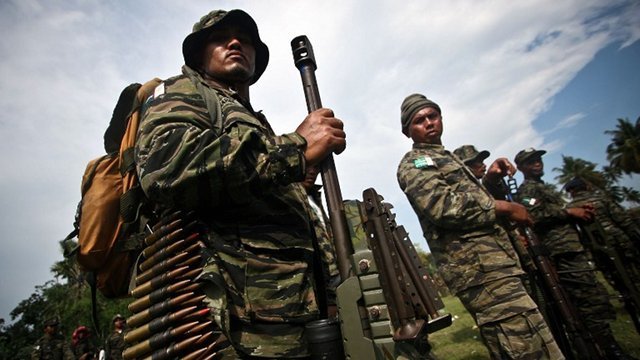Decommissioning of the troops comes after the ratification of the Bangsamoro Law and is part of the Philippine government's agreement with the MILF

Cabinet Secretary Karlo Nograles announced on Tuesday, June 18, that some 12,000 former Moro Islamic Liberation Front (MILF) troops are set to be decommissioned following the creation of a new Bangsamoro region.
Nograles, who co-chairs the Inter-Cabinet Cluster Mechanism on Normalization (ICCMN) together with Presidential Peace Adviser Carlito Galvez Jr said the number represents "close to a third" of former MILF soldiers.
Timeline set: The decommissioning of the troops comes after the ratification of the Bangsamoro Law in January 2019 and is part of the Philippine government's agreement with the MILF reached during the administration of Benigno Aquino III.
Nograles said the decommissioning of the 12,000 former MILF troops marked the second phase of the decommissioning process. The third phase is expected to be completed by 2020 and the fourth and last phase, by 2022.
“We have targeted the decommissioning of 30% of combatants by 2019, 35% by next year, and the remainder by 2022," Nograles said, adding the government was confident it could meet the targeted timeline.
What happens to former MILF troops? A critical part of the agreement between the government and the MILF was the decommissioning of combatants and weapons. After an initial decommissioning in 2015, the MILF had to add 30% more of troops and weapons after the ratification of the Bangsamoro Organic Law.
During this transition period, MILF soldiers slowly give up their weapons and transition to civilian life. Programs for MILF members will be created to facilitate this, while camps will be transformed into productive communities.
According to Nograles, the former troops and their families are expected to receive the following assistance:
Nograles, who co-chairs the Inter-Cabinet Cluster Mechanism on Normalization (ICCMN) together with Presidential Peace Adviser Carlito Galvez Jr said the number represents "close to a third" of former MILF soldiers.
Timeline set: The decommissioning of the troops comes after the ratification of the Bangsamoro Law in January 2019 and is part of the Philippine government's agreement with the MILF reached during the administration of Benigno Aquino III.
Nograles said the decommissioning of the 12,000 former MILF troops marked the second phase of the decommissioning process. The third phase is expected to be completed by 2020 and the fourth and last phase, by 2022.
“We have targeted the decommissioning of 30% of combatants by 2019, 35% by next year, and the remainder by 2022," Nograles said, adding the government was confident it could meet the targeted timeline.
What happens to former MILF troops? A critical part of the agreement between the government and the MILF was the decommissioning of combatants and weapons. After an initial decommissioning in 2015, the MILF had to add 30% more of troops and weapons after the ratification of the Bangsamoro Organic Law.
During this transition period, MILF soldiers slowly give up their weapons and transition to civilian life. Programs for MILF members will be created to facilitate this, while camps will be transformed into productive communities.
According to Nograles, the former troops and their families are expected to receive the following assistance:
- Housing
- Livelihood assistance
- Skills development training
- Scholarships
- Employment opportunities
- Philippine Health Insurance coverage
- Conditional cash transfers
- Documentation like birth certificates and postal IDs
The decommissioning of the troops comes after the ICCMN was created in April 2019 to implement programs to help improve the quality of life of former MILF combatants, their families, and other poverty-stricken and vulnerable sectors in the Bangsamoro region.
https://www.rappler.com/nation/233369-former-milf-troops-decommissioned-under-bangsamoro-normalization-process-2019

No comments:
Post a Comment
Note: Only a member of this blog may post a comment.